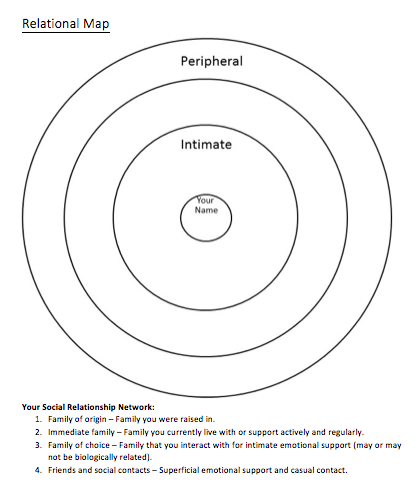By Susan Harkema:
Solving our family issues starts with understanding, “Where are we anyhow?!”
Take, for instance, my situation. My 83-year old father moved in with my husband and me about a year ago after a serious stroke. And, although I love my father and was well aware of his quirks and challenging personality, I was not prepared for the degree of change that three adults living together would require. After a few weeks, the energy in the house was tense and things were strained.
That’s why I was thrilled to sit down with Nancy Wood, LSW, BSN, adult relationship expert, to get her perspective on where to start when trying to make sense out of challenging adult relationships.
Nancy revealed that it’s really helpful to take a step back and get a full view of your adult relationships. We each belong to not just one family, but to three family types – plus a group that includes friends, co-workers and acquaintances.

She pulled out a tool that she evolved into a worksheet she calls a Relational Map. The map is a simple template with powerful implications. You can visually arrange your adult social relationships by level of depth and intimacy.
Here’s how it works:
- Write your name in the middle of the three rings
- Then, place the names of people you are closest to from your four social groups, including:
- Family of origin – Family you were raised in.
- Immediate family – Family you currently live with or support actively and regularly.
- Family of choice – Family that you interact with for intimate emotional support (may or may not be biologically related).
- Friends and social contacts – Superficial emotional support and casual contact.
- As you think of people in these four groups, you’ll want to decide where they go on the map and write their names down.
- Are they the closest to you emotionally? They may go in the ring closest to you or in the rings further out from your center, indicating that you are not as emotionally close with them.
As you think of names, you’ll begin to see patterns emerge. You may be surprised to see some names are closer to you and some names are further away. While some names didn’t even make the map!
Although I came to Nancy for guidance and insight into my relationship with my elderly father living with us, I made some amazing discoveries that have really improved my relationships:
- The exercise of writing down names calls into question my judgments about my relationship with those people and what, if anything, I want to do about them.
- I discovered that, not surprisingly, I am closer to some friends than my own family?
- However, I was surprised to reveal that I am closer to the adult child of a peer family member than the peer I knew since birth.
- I was, also, surprised that some people that I “should” be closer with didn’t even make it onto the map.
Not only did the map expose some tough truths about which relationships are not as intimate as I expected, or assumed “should” be, but it was exciting to realize that not all relationships are equal and there are reasons why I am closer to some people than others.
What I took away from my visit with Nancy were two “Aha!” moments.
First, that it’s OK if some relationships don’t get as much nurturing as others. The map helped me become clear about what I want that relationship to be about and how I can maintain it better.
Second, that there were relationships that I really WANT to have in the inner ring. So the map helped me uncover that desire and make a plan for what I was going to do to make those relationships better.
The Relational Map is a wonderful tool to help give you perspective as well as provide insights so that you can proactive evolve and transform your adult relationships.
Looking to go in-depth? There are two options.
1. For caring professionals our workshop “Transforming adult-to-adult relationships” highlights the best of many therapeutic modalities combined with a focus on practical and sustainable change (6 CEUs).
2. For individuals with or without other family members come to our 2 day, 8 hour workshop to learn more about productively transforming your adult-to-adult relationships.
